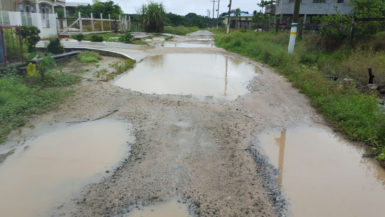Some of Bartica’s major roads are slated to be repaired and Mayor Gifford Marshall says the Town Council will be looking towards limiting their use by heavy-duty vehicles.
The Ministry of Public of Infrastructure (MPI) recently invited bids for the rehabilitation and construction of several roads in Region Seven.
Marshall said the work is very welcomed as the roads in town have been in a bad condition for years.
“Presently our roads are in a deplorable state and mainly because of the extreme weather we have had over the past few months, so we made some representation at the Town Council level for the government to intervene and provide the necessary resources,” Marshall said.
He identified the Central Bartica road, Byderabo Backroad, the Byderabo Hilltop road, the West Bartica road and 4 Miles as those roads due for rehabilitation through a collaboration between the MPI, the Ministry of Communities and the Regional Democratic Council (RDC).

“While the Ministry of Public Infrastructure will spend approximately $50 million [and] the Ministry of Communities will spend just about $20 million, there are still a number of roads that need to be maintained and the crisis area is the main access road to the housing scheme in Four Miles,” Marshall pointed out.
“If you say the road is deplorable, then it’s an understatement,” he added, while noting that while the cost to repair the road is very high, even if a piece is completed it will bring great relief to the residents.
Marshall emphasised that the move is welcomed and that the residents will greatly benefit but the Town Council still faces a number of issues, such as the number of heavy-duty trucks regularly traversing the town’s roads. “Most of them take fuel by drums and so there is added weight and fuel spills on the asphalt, which deteriorates it,” Marshall said as he pointed out that the Town Council has to make a decision on how to address the issue to prolong the lifespan of the roads.
He emphasised that there will be consultations with the companies and truck drivers and the first option that is being discussed is restricting the heavy-duty trucks from accessing some of the roads. He said that the idea is to keep the vehicles away from areas where there are schools, playfields and other important buildings and the central business district.
“If we restrict you from passing the market, you can still use Second Avenue and pass somewhere else to go to your destination,” he said.
Marshall said another issue is where some of the trucks would go on the beaches and leave waste oil, tyres and engine parts, which he emphasised “definitely cannot continue.”
“Trucks use the beach as a washing centre and that too pollutes the river and leaves the beach in a bad state. If we are going green and focusing on tourism, we definitely can’t have the beaches like that and right now it’s hot and people will frequent the beach and you don’t want to go like that,” he said.
Marshall explained that in addition to relief to the residents, the upgrading of the roads will influence the people financially as transportation will become cheaper and areas where drivers were hesitant to travel will no longer be a problem. “Once the roads are done, prices will drop and persons will be able to be transported to their homes and some part of Four Miles where vehicles don’t go,” he said.
Marshall pointed out that while the Town Council has only been active for four months, there is a challenge to ensure all the roads are done and since they do not have the financial resources, they lobbied the MPI to assist. “We identified the roads and asked them to do it. Four Miles is not in their budget but they are going to try to fit it in,” he said.
Christopher George, a taxi driver, echoed the mayor’s sentiments and said that it was time that the roads are fixed. “As a taxi driver, it will greatly benefit me as I don’t have to worry about the wear and tear that much anymore. Before the roads would be extremely bad and you wouldn’t want to go anywhere ’cause you would have to study about parts,” he said.





